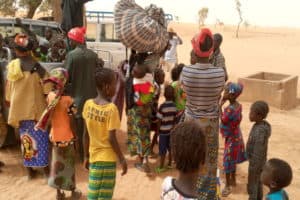In Africa’s Sahel, ‘places where Christians and Muslims live alongside one another are next target’ for Islamist terror
BACK IN 2015, Olivier Hanne, a specialist in Islam and researcher at the University of Aix-Marseille, France, described what he regarded as “the most probable scenario for 2020 in the Sahel.” In Jihad in the Sahel, co-authored with Guillaume Larabi, he foresaw an expansion of armed terrorist groups in the Sahel in defiance of national government authorities. In 2019, more than 5,000 Christians and Muslims were killed by Islamist terrorists in the region. Prof. Hanne recently spoke with Aid in the Church in Need:
Instead of disengaging from the Sahel, as had been announced, France has just announced a reinforcement of 600 soldiers. Can you see any way out of the crisis in the Sahel? The armed terrorist groups are set for the long-term. They hold sway over vast portions of the Sahel. They have revenue thanks to the extortion of money from local people, and also from illegal trafficking. They control the transit routes for migrants, who are easy prey for their trade in human trafficking. And they also profit from the smuggling of drugs, a major proportion of which comes through the port of Lagos in Nigeria and from there is brought clandestinely into Europe. Cocaine, originating in South America, travels across the Sahara, often hidden inside vehicle tires.

How do you explain why these groups can gain the support of a section of the population in the areas they control?
The areas in question are completely neglected and abandoned by their own governments. Even before colonialism, the economy of these regions depended on illegal trafficking. The state is perceived as distant, illegitimate, and corrupt. Young Peuls or Tuaregs are very conscious that they are living in a situation without prospects. They live in very hierarchical societies, under the domination of religious leaders and heads of families.
The success of these armed terrorist groups is explained in large measure by the rise to power of these young men, thirsting for action, wanting to flex their muscles. This is why, in particular, the Islamic State in the Greater Sahara has had so much success since it was created in 2015. It is more active and aggressive than other groups, such as Al Qaeda in the Islamic Maghreb, for example.
How do terrorist groups, who don’t have many resources, achieve such success in the face of the regular armies?
They are very mobile and don’t need great resources. They attack and then disperse again with ease. Above all, they take advantage of the state of the forces facing them! In Mali they recently were able to attack a military post with impunity because the soldiers were not even on guard. It has to do with the general level of military training and when one sees this kind of behavior after 60 years of military co-operation between France and Mali, one becomes pessimistic about the future.

There is a lack of trust between the soldiers and their military hierarchy, which leads to disastrous results on the ground. In Burkina Faso the government is beginning to arm civilians, which is a very worrying development. Experience has shown that this is the best possible way to sow the seeds of civil war.
How is the situation likely to develop?
I fear that over the next five years the territorial expansion of the armed terrorist groups will continue. The trafficking will become more organized and will increase further. After having extended their grip on the Muslim Sahara, the terrorists’ next target will be the places where Christians and Muslims live alongside one another. In Burkina Faso and in Nigeria the equilibrium that has existed hitherto is now under threat. In the next five years, these African states will continue to need the support of the West if they are to avoid catastrophe. Were it not for the intervention of France, Mali would already have been cut in two. And the attempted coup in Chad in 2013 might well have succeeded. This all feeds into the propaganda of the jihadists, who like to play on the anti-French resentment, but there is no other way of keeping the situation from getting worse.
—Thomas Oswald

